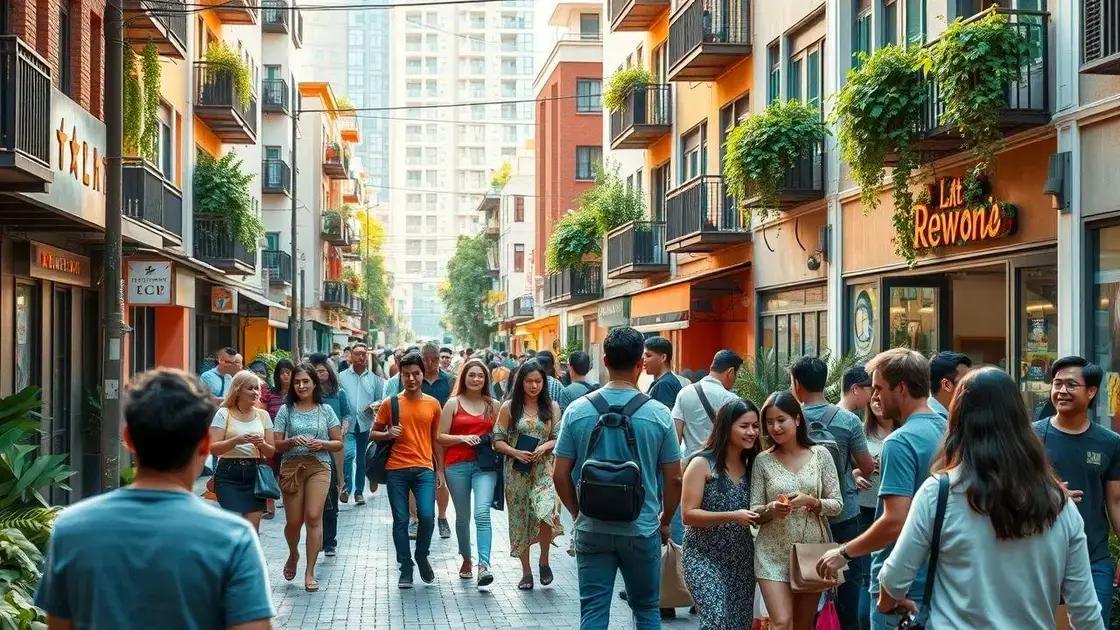Social fairness in 2025: benefits that bring security

Social fairness in 2025 enhances security by fostering trust, reducing inequality, and promoting inclusive initiatives that create stronger, more resilient communities.
Social fairness in 2025 is more than just a concept; it’s a vision that promises significant improvements in our lives. Have you ever wondered how fair policies can create lasting security for communities? Let’s explore the potential benefits.
Understanding social fairness in 2025
Understanding social fairness in 2025 is crucial for building a just society. It involves recognizing and addressing inequalities in various aspects of life. Fairness means creating opportunities for all, regardless of their background. As we navigate the challenges of the future, this concept will guide our strategies.
What is Social Fairness?
Social fairness refers to the idea that everyone should have equal access to resources and opportunities. It’s about ensuring that no one is left behind due to discrimination or systemic barriers. In 2025, we envision a world where everyone feels valued and included.
Key Components of Social Fairness
- Equitable access to education and healthcare
- Elimination of discrimination based on race, gender, or socioeconomic status
- Support for marginalized communities
These components work together to form a foundation of fairness. When we address these areas, we contribute to a society that celebrates diversity and promotes harmony.
The Role of Policies
Government policies play a vital role in promoting social fairness. Laws designed to protect individual rights can help dismantle systemic inequalities. By focusing on inclusive policies, we can create a more balanced playing field for every person. Additionally, community initiatives that aim to support the disadvantaged can drive changes at the grassroots level.
Real-Life Examples
Some cities have already made strides towards social fairness by implementing programs like universal basic income or affordable housing initiatives. These examples demonstrate how targeted efforts can lead to significant improvements in people’s lives, highlighting the importance of fair treatment.
In summary, understanding social fairness in 2025 is about collective responsibility. It’s a commitment to ensuring everyone benefits from our society’s progress, growing together toward a more equitable future.
Key benefits of social fairness for society

The key benefits of social fairness for society are profound and far-reaching. A fair society reduces inequality, fostering a sense of belonging among its members. When everyone feels included, communities become stronger and more resilient. A commitment to fairness helps us address long-standing issues that affect people’s lives.
Enhanced Social Stability
One major benefit is enhanced social stability. When individuals believe they have equal access to opportunities, there is less unrest. This stability allows for productive dialogue and cooperation among diverse populations. By focusing on fairness, we create a peaceful environment where people can thrive.
Economic Growth Opportunities
Social fairness can also drive economic growth. Inclusive policies ensure that all individuals have the chance to contribute to the economy. This participation leads to increased innovation and productivity. When diverse perspectives come together, we can solve complex problems more effectively.
- Access to education and job training
- Support for entrepreneurship among underrepresented groups
- Investment in community resources and infrastructure
These factors lead to a more vibrant economy that benefits everyone. Additionally, as people rise together, communities see improvements in health and well-being.
Improved Relationships and Trust
Social fairness fosters trust within communities. When individuals feel they are treated fairly, they are more likely to engage with one another positively. This engagement builds relationships that are vital for community growth. As we nurture a culture of fairness, we also encourage collaboration and mutual respect.
Ultimately, the key benefits of social fairness pave the way for a society that values everyone. By embracing fairness, we ensure a better future for the next generations.
How social fairness can enhance security
Understanding how social fairness can enhance security is essential for building safer communities. When people feel that they are treated fairly and equally, they are more likely to trust their neighbors and local authorities. This trust fosters a sense of safety that is vital for vibrant neighborhoods.
Building Trust Among Communities
Social fairness leads to improved relationships within communities. When individuals believe they have a voice and are included in decision-making, they participate more actively. This participation creates strong bonds that can act as a protective factor against crime.
Preventing Crime Through Inclusion
Inclusive communities are less likely to experience violence and crime. When residents feel they belong, they are more inclined to look out for one another. This sense of responsibility helps to detour criminal behavior. Studies show that neighborhoods with high levels of trust see significant reductions in crime rates.
- Community watch programs that unite residents
- Neighborhood events that encourage connection
- Support systems for those in need
These initiatives not only reinforce community bonds but also reduce feelings of isolation, which can lead to potential threats. In this way, social fairness directly contributes to a safer environment.
The Role of Policy in Enhancing Security
Policies designed to promote social fairness can also enhance security. Governments can enact laws that protect marginalized groups, ensuring everyone has equal rights and safety. By addressing systemic inequalities, these policies build a foundation of security that benefits all community members.
Additionally, investing in community resources, such as mental health services and educational programs, strengthens the security framework. As more individuals are provided with support, communities become more resilient against various forms of distress.
Real-world examples of social fairness initiatives

Real-world examples of social fairness initiatives provide insight into how communities can make a difference. By promoting fairness, societies around the world have taken steps that lead to positive changes. These initiatives serve as models for others seeking to improve their own communities.
Universal Basic Income Programs
One notable example of a social fairness initiative is the implementation of universal basic income (UBI) programs. Cities like Stockton, California, have tested UBI to provide residents with a monthly stipend, helping to alleviate poverty. This program supports individuals in need, allowing them to cover essential expenses and improve their quality of life.
Inclusive Education Initiatives
Another powerful approach is inclusive education. Programs designed to support students with disabilities or those from marginalized backgrounds ensure that everyone has access to quality education. For example, Finland has adopted measures that emphasize equal opportunities for all students. This creates an environment where children can learn and grow together without discrimination.
- Scholarships for low-income students
- Support services for English language learners
- Training programs for teachers on inclusivity
These initiatives highlight the importance of equity in education, paving the way for future generations.
Community Health Initiatives
Health is another area where social fairness is vital. Many communities have launched health initiatives aimed at reducing disparities in access to care. For instance, neighborhoods in Atlanta have developed mobile health clinics to reach underserved populations. These clinics offer essential services like vaccinations and health screenings to those who may not otherwise receive them.
Ultimately, real-world examples of social fairness initiatives demonstrate the power of collective action. When communities focus on inclusion and support, they lay the groundwork for a fairer society for everyone.
social fairness leads to a stronger, more secure society. By recognizing the value of inclusivity, we can create communities where everyone thrives. The real-world examples we explored show how initiatives can make a positive impact. These efforts not only enhance individual lives but also contribute to the overall well-being of society. Whether through education, healthcare, or economic support, every step towards fairness is a step towards a brighter future for all.
FAQ – Frequently Asked Questions about Social Fairness Initiatives
What is social fairness?
Social fairness is the idea that everyone should have equal access to resources and opportunities, regardless of their background.
How do social fairness initiatives impact communities?
These initiatives strengthen communities by promoting trust, reducing inequality, and enhancing overall security and well-being.
Can you provide examples of successful social fairness programs?
Examples include universal basic income programs, inclusive education initiatives, and community health clinics that serve marginalized populations.
Why is social fairness important for economic growth?
When everyone has equitable opportunities, it leads to greater participation in the economy, fostering innovation and productivity.





